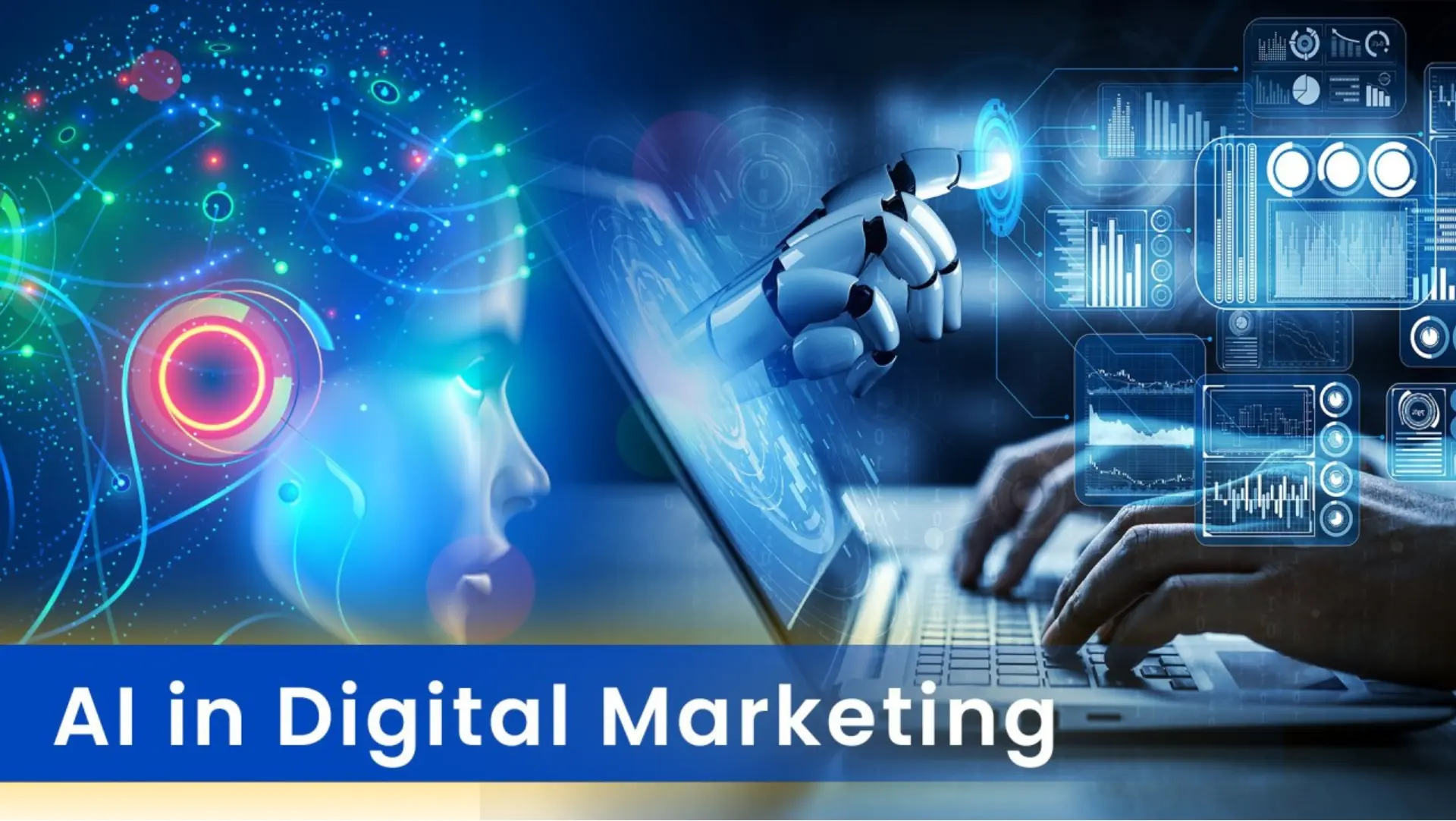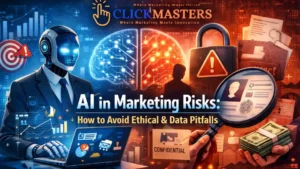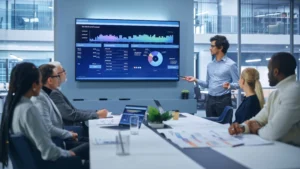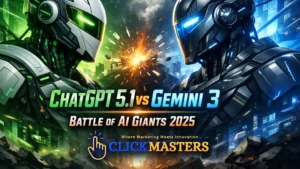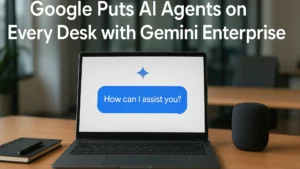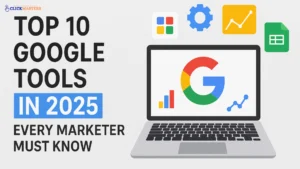The digital marketing world is undergoing a revolutionary change in 2025, with AI in digital marketing and automation technologies improving and reshaping how businesses connect with their audiences. As we progress through 2025, AI-powered marketing automation has evolved from a competitive advantage to an essential business requirement. This comprehensive guide explores the latest trends, statistics, and insights that tell how AI automation is changing the digital marketing game. Digital marketers are using intelligent systems to boost engagement, optimize ad spend, personalize content, and drive ROI like never before.
In this blog, we’ll explore how AI in digital marketing is reshaping the landscape in 2025.
What Is AI in Digital Marketing?
AI in digital marketing refers to the use of machine learning, data analytics, and automation to optimize marketing efforts. It includes intelligent tools that can:
Analyze vast amounts of consumer data
Personalize messages in real time.
Automate campaigns
Predict consumer behavior
Improve content targeting and ROI. These tools work across SEO, email marketing, paid ads, social media, and customer support, transforming traditional marketing into a hyper-personalized, automated system.
The Current State of AI in Digital Marketing
The adoption of AI in digital marketing has reached great levels in 2025. According to recent industry research, over 37% of marketing teams have embraced AI as a core part of their strategy. This represents a significant shift from previous years when AI was considered an experimental technology.
The most significant impact of AI in marketing is visible in content creation and personalization. The most common applications of AI were, nevertheless, using it to support copywriting for email marketing, organic search, and social media. This widespread adoption demonstrates how AI has become integral to everyday marketing operations rather than just advanced analytics.
Key AI Marketing Automation Statistics for 2025
Return on Investment (ROI) Performance
The financial impact of AI-powered marketing automation continues to impress business leaders in 2025. On average, companies make $5.44 for every $1 they spend on marketing automation. This translates to an ROI of 544%(Digital Silk). This remarkable return on investment showcases why businesses are rapidly adopting AI-driven marketing solutions.
The speed of realizing these benefits has also improved significantly. 76% of companies see ROI from marketing automation within a year. This quick turnaround time makes AI marketing automation an attractive investment for businesses looking for immediate impact.
Enhanced Performance Metrics
AI-powered marketing automation is delivering great improvements across multiple performance indicators. AI-powered predictive analytics can improve marketing ROI by 20–30%(WebFX), while AI-driven data analysis can reduce marketing campaign costs by about 30%. These improvements demonstrate the dual benefit of AI automation: increased effectiveness and reduced costs.
Customer segmentation, a critical component of successful marketing campaigns, has also seen significant improvements. AI-powered customer segmentation can increase conversion rates by roughly 15%. This improvement in targeting accuracy directly translates to better campaign performance and higher revenue generation.
Top AI Marketing Automation Trends in 2025
1. Hyper-Personalization at Scale
Personalization remains the cornerstone of effective digital marketing in 2025, but AI has elevated it to new heights. Marketers are effectively using AI to craft more targeted strategies, understand customer nuances, and ultimately achieve higher engagement and conversion rates, with Enhanced Personalization (42.02%) and Better Targeting (36.30%) also scoring high among the impactful outcomes of AI adoption.
Modern AI systems can analyze vast amounts of customer data to create highly personalized experiences across multiple touchpoints. 77% of marketers use automation tools to create personalized content for their audiences, indicating that personalization has become standard practice rather than a luxury feature.
2. Predictive Analytics and Customer Behavior Modeling
AI’s ability to predict customer behavior has reached new levels of sophistication in 2025. Machine learning algorithms can now process complex data patterns to forecast customer preferences, purchase intentions, and lifecycle stages with remarkable accuracy.
One key trend is the increasing use of AI to automate routine tasks. From handling FAQs to inventory planning, more workflows are going fully autonomous, freeing up human teams for higher-level strategic work. This shift allows marketing teams to focus on creative and strategic initiatives while AI handles data processing and analysis.
3. Automated Content Creation and Optimization
Content creation has been revolutionized by AI technologies in 2025. AI-powered tools can generate blog posts, social media content, email campaigns, and advertising copy at unprecedented speed and quality. However, the most significant advancement is in content optimization, where AI continuously tests and refines content based on performance data.
49% of marketers rely on automation for social media management, demonstrating how AI has become essential for maintaining a consistent and effective social media presence across multiple platforms.
4. Enhanced Lead Generation and Nurturing
Lead generation has become more sophisticated with AI-powered automation. 80% of marketing automation users report generating more leads, showcasing the effectiveness of AI in identifying and attracting potential customers. (CoSchedule)
The lead-nurturing process has also been enhanced through AI automation. 51.43% of marketers say they use automation for customer profiling, enabling more accurate segmentation and personalized communication throughout the customer journey.
5. Cross-Channel Integration and Orchestration
AI marketing automation in 2025 excels at coordinating campaigns across multiple channels. Modern AI systems can optimize message timing, channel selection, and content variation based on individual customer preferences and behaviors across email, social media, web, and mobile platforms.

Top AI Tools Used in Digital Marketing
Here are the most impactful AI tools marketers are leveraging in 2025:
| Tool | Function | Notable Feature |
| ChatGPT | Content creation, automation | Natural language generation |
| Jasper | AI copywriting | Brand voice customization |
| HubSpot AI | CRM & Marketing Automation | Predictive lead scoring |
| Surfer SEO | Content SEO optimization | Real-time SERP data analysis |
| Adzooma | PPC automation | Smart budget allocation |
| Drift AI | Chatbots & conversational marketing | Account-based messaging |
The Business Impact of AI Marketing Automation
Increased Efficiency and Productivity
The productivity gains from AI marketing automation are substantial. Marketing automation increased using AI by 250% in 2023, indicating rapid adoption and implementation across various business functions.
44% of practitioners anticipate increased pressure to drive engagement and conversions. Similarly, 43% expect heightened demands to scale content output while keeping it personalized and relevant. AI automation helps marketing teams meet these increasing demands without proportionally increasing resources.
Enhanced Customer Experience
AI-powered personalization has created more meaningful customer experiences. 83% of customers are happy to share their data if that means they will receive personalized content, demonstrating that consumers value personalization when it’s executed effectively.
The improvement in customer engagement is evident in email marketing performance. Automated newsletters have an open rate that is typically higher than manually sent newsletters by about 20-30% on average, indicating that AI-optimized content resonates more effectively with audiences.
Revenue Growth and Sales Performance
The connection between AI marketing automation and revenue growth is clear. Companies that use AI-powered marketing automation experience a 15% increase in sales revenue, compared to those that do not. This direct correlation between AI adoption and revenue growth demonstrates the tangible business value of these technologies.
Challenges and Considerations
Skills and Strategy Gaps
Despite the benefits, organizations face significant challenges in implementing AI marketing automation. Skills and strategy gaps are the main barriers—invest in training, indicating that successful implementation requires both technological adoption and human capital development.
Integration Complexity
As AI marketing automation becomes more sophisticated, integration with existing marketing technology stacks becomes increasingly complex. Platform choice matters: HubSpot leads, but integration, usability, and AI capabilities are top priorities. Organizations must carefully evaluate their technology choices to ensure seamless integration and maximum effectiveness.
Data Privacy and Compliance
With the increased capabilities for data collection and analysis, organizations must navigate complex privacy regulations while maintaining customer trust. The challenge lies in striking a balance between personalization benefits and privacy protection requirements.
Implementation Strategies for 2025
Start with Clear Objectives
Successful AI marketing automation implementation begins with clearly defined goals and key performance indicators. Organizations should identify specific use cases where AI can deliver the most significant impact, such as lead scoring, content personalization, or customer segmentation.
Invest in Data Quality
AI marketing automation is only as effective as the data it processes. Organizations must prioritize data collection, cleaning, and organization to ensure AI systems can generate accurate insights and recommendations.
Focus on Human-AI Collaboration
The most successful AI marketing automation implementations combine artificial intelligence capabilities with human creativity and strategic thinking. AI is driving clear improvements in routine tasks while enabling human teams to focus on higher-level strategy and creative work.
Continuous Learning and Optimization
AI marketing automation requires ongoing monitoring, testing, and optimization. Organizations should establish processes for regular performance review and system refinement to maximize effectiveness over time.
Future Outlook: AI Marketing Automation Beyond 2025
The trajectory of AI marketing automation continues to point toward greater sophistication and integration. By 2025, AI-driven personalization and campaign management are table stakes, indicating that what seems advanced today will become standard practice.
The evolution of AI technologies suggests that future developments will focus on even more sophisticated predictive capabilities, enhanced natural language processing, and deeper integration across all marketing channels and customer touchpoints.
Conclusion
AI in digital marketing automation has fundamentally transformed how businesses engage with their customers in 2025. The statistics and trends presented demonstrate that AI is no longer a futuristic concept but a present reality delivering measurable business value. From impressive ROI figures to enhanced customer experiences, AI marketing automation has proven its worth across multiple dimensions.
The success stories and performance metrics show that organizations implementing AI marketing automation are not only improving their operational efficiency but also creating more meaningful customer relationships and driving significant revenue growth. As we move forward, the businesses that embrace AI marketing automation will continue to gain competitive advantages, while those that resist may find themselves at a significant disadvantage.
How Click Master Digital Agency Can Help
At Click Master Digital Agency, we help businesses harness the power of AI-driven marketing automation. Our services include:
AI-powered SEO and content strategies
Intelligent PPC and programmatic ad management
AI chatbot integration and CRM automation
Data analytics and predictive marketing solutions
Contact us! Click Master Digital Agency,
Frequently Asked Questions (FAQs)
What is AI marketing automation?
AI marketing automation refers to the use of artificial intelligence technologies to automate marketing tasks and processes. This includes lead scoring, content personalization, customer segmentation, predictive analytics, and campaign optimization. AI systems can analyze large amounts of data to make intelligent decisions about marketing strategies and customer interactions.
How much ROI can businesses expect from AI marketing automation?
According to current industry statistics, businesses can expect significant returns from AI marketing automation. Companies make an average of $5.44 for every $1 spent on marketing automation, representing a 544% ROI. Additionally, 76% of companies see ROI within the first year of implementation.
What are the most common applications of AI in digital marketing?
The most common applications include copywriting support for email marketing, organic search, and social media content creation. Other popular uses include customer profiling (51.43% of marketers), social media management (49% of marketers), and creating personalized content (77% of marketers).
How does AI improve marketing personalization?
AI enhances personalization by analyzing customer behavior patterns, preferences, and interactions across multiple touchpoints. This analysis enables marketers to create highly targeted content and experiences. AI-powered customer segmentation can increase conversion rates by approximately 15%, while enhanced personalization leads to better engagement and higher conversion rates.
What challenges do businesses face when implementing AI marketing automation?
The main challenges include skills and strategy gaps, integration complexity with existing systems, and data privacy considerations. Organizations need to invest in training their teams and carefully evaluate platform choices to ensure successful implementation. Additionally, maintaining data quality and compliance with privacy regulations remains a significant concern.
How is AI changing content creation in marketing?
AI is revolutionizing content creation by enabling automated generation of blog posts, social media content, email campaigns, and advertising copy. More importantly, AI continuously optimizes content based on performance data, ensuring that messaging resonates with target audiences. Automated newsletters typically achieve 20-30% higher open rates compared to manually sent newsletters.
What role does predictive analytics play in AI marketing automation?
Predictive analytics powered by AI helps marketers forecast customer behavior, identify potential leads, and optimize campaign timing. AI-powered predictive analytics can improve marketing ROI by 20-30% while reducing campaign costs by about 30%. This capability allows marketers to make data-driven decisions and allocate resources more effectively.
How does AI marketing automation affect lead generation?
AI significantly enhances lead generation capabilities, with 80% of marketing automation users reporting increased lead generation. AI systems can identify potential customers more accurately, score leads based on likelihood to convert, and nurture leads through personalized communication sequences. This results in higher quality leads and improved conversion rates.
What is the future of AI in digital marketing?
The future of AI in digital marketing points toward even greater sophistication and integration. By 2025, AI-driven personalization and campaign management are expected to become standard practice rather than competitive advantages. Future developments will likely focus on enhanced predictive capabilities, better natural language processing, and deeper cross-channel integration.
How can small businesses benefit from AI marketing automation?
Small businesses can benefit from AI marketing automation by leveraging affordable AI-powered tools for email marketing, social media management, and customer segmentation. These tools can help small businesses compete with larger companies by providing sophisticated marketing capabilities without requiring large teams or extensive technical expertise. The key is to start with specific use cases and gradually expand AI implementation.

